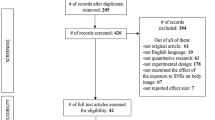Abstract
Over the last two decades, the focus of happiness research has shifted from the measurement of life quality with an emphasis on material well-being to subjective well-being. This article follows this direction of development, but moves further into social well-being. Utilizing the method of social quality analysis, this study developed an analysis of happiness by looking into the influence of social factors on happiness. The study was established on the basis of empirical data collected from a social quality survey done in Hangzhou, Xiamen, and Shenzhen during 2011–2012. The purpose of this study is to expose the relationships between social quality analysis and happiness studies. The study demonstrates a strong correlation of social quality factors with happiness, although each set of these factors has a different impact on happiness in different factor domains.
Similar content being viewed by others
References
Abbott, P., Wallace, C., & Sapsford, R. (2011). Surviving the transformation: Social quality in Central Asia and the Caucasus. Journal of Happiness Studies, 12, 199–223.
Bradburn, N. M. (1969). The structure of psychological well-being. Chicago: Aldine.
Bureekul, T. & Thananithichot, S. (2012). Trust and Social Cohesion, the Key to Reconcile Thailand’s Future, 2(2): 81–97.
Chen, F. (2006). “Happiness index” to evaluate development, http://www.gov.cn/english/2006-03/01/content_214184.htm.
China News (2011). Reflecting public opinion on life satisfaction, available from: http://news.china.com/domestic/945/20110921/16778384.html.
Clark, A. E., & Senik, C. (2010). Will GDP Growth Increase Happiness in Developing Countries? IZA Discussion Paper No. 5595. Available at SSRN: http://ssrn.com/abstract=1796590.
Diener, Ed. (2000). Subjective Well-being: The Science of Happiness and a Proposal for a National Index, American Psychologist, 55(1), Jan 2000.
Diener, E., & Biswas-Diener, R. (2009). Will money increase subjective well-being?: a literature review and guide to needed research. Social Indicators Research, 37, 119–154.
Lever, J. P. (2004). Poverty and subjective well-being in Mexico. Social Indicators Research, 68(1), 1–20.
Li, J., & Zhao, Y. (2000). Validation of Index of Well-being in a Sample of Chinese College Students. Chinese Journal of Clinical Psychology, No.4/2000.
Lin, K. (1999). Confucian welfare cluster. A cultural interpretation of social welfare. Tampere: University of Tampere.
Lin, K. (2011). The prototype of social quality theory and its applicability to Asian society, social quality and welfare system sustainability. International Journal of Social Quality, 1(1), 57–70.
Lin, K., Xu, Y., Huang, T. H., & Zhang, J. H. (2012). Social exclusion and its causes in east Asian societies: evidences from SQSQ survey data. Social Indicators Research. doi:10.1007/s11205-012-0074-0.
Ou-yang, H. (2011). An over View on the Focus of Consumption in China, XiaoKang Magazine, February, 2011.
ROCL (Research Office of Confttable Living, Yichang City). (2013). The Values of GDP and GDP per capital of Chinese Cities 2012, Available from: http://www.elivecity.cn/html/jingjifz/731.html, accessed in 2013.5.10.
Ryff, C. D., & Keyes, C. L. M. (1995). The structure of psychological well-being revisited. Journal of Personality and Social Psychology, 69, 719–727.
Walker, A. C., & van der Maesen, L. J. G. (2004). Social quality and quality of life. In W. Glatzer, S. von Below, & M. Stoffregen (Eds.), Challenges for quality of life in the contemporary world (pp. 13–31). The Hague, London, Boston: Kluwer Academic Publishers.
Ward, P., & Meyer, S. (2009). Trust, social quality and wellbeing: a sociological exegesis. Development and Society, 38(2), 339–363.
Xing, Z. & Zhang, Y. (2007). Research on the Relation Between Social Support and Subjective Well-being. Social Science Research, No.6/2007.
Acknowledgments
This study is supported by the EU project on Social Innovation and the Chinese Foundation of Social Sciences on social quality project. The author also appreciates Ms. Chaoying An and Mr. Fan Wu for their technical assistance.
Author information
Authors and Affiliations
Corresponding author
Rights and permissions
About this article
Cite this article
Lin, K. Social Quality and Happiness—An Analysis of the Survey Data from Three Chinese Cities. Applied Research Quality Life 11, 23–40 (2016). https://doi.org/10.1007/s11482-014-9352-0
Received:
Accepted:
Published:
Issue Date:
DOI: https://doi.org/10.1007/s11482-014-9352-0




